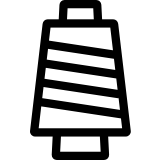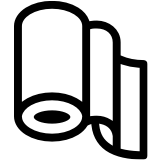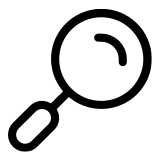Sustainability
The value chain
The value chain or textile chain describes the totality of all production and trading stages that a textile product undergoes.
Here are the 6 steps that are particularly significant for the path of our fabrics, collected for you.
Raw material
The textile value chain begins with the production of the seeds, the cultivation of the organic cotton, the harvest and the industrial ginning (separation of tufts and seeds). learn more
Spinning
In the spinning unit, the cotton balls are broken up, combed, cleaned and finally spun into threads, which are then spun up on spools. learn more
Knitting/Weaving
In the knitting unit, we produce knits such as e.g. Jersey, interlock or sweat fabrics. In the weaving unit we produce, for example, satin, poplin or crettone fabrics. learn more
Textile finishing
A raw knitted or woven organic cotton fabric has to be finished. That means it has to be preshrunk, dyed, softened or possibly printed and much mire. All finishing processes are certified to the highest environmental standards and according to the GOTS. learn more
Quality control
All Lebenskleidung fabrics are subject to a double physical quality check. Once at each production location & amp; in addition a final physical inspection takes place at our warehouse location and in the laboratory in Germany. learn more
Logistics
At the end of the textile chain, we will send your desired fabrics to your doorstep And that is carbon neutral with our service providers from UPS. Now for our fabrics a new life cycle begins in your studio or in your garmenting unit.
Our materials
At the heart of Lebenskleidung are materials that are produced fairly and sustainably and have a long life. Our focus is on fabrics made from organic cotton, but time and again we supplement our portfolio with new qualities such as wool or Tencel™.
Textile cerfification
Textile seals give you security. With them, you have the guarantee that your fabrics have gone through various independently approved certification steps.
Please note: not all our products are GOTS certified
The GOTS Standard
GOTS stands for Global Organic Textile Standard and means a minimum standard that is indispensable for us and that takes account of ecological criteria as well as social standards. Many of our fabrics are GOTS certified and ultimately give both us and you safety & reliability. Once a year, GOTS conducts a comprehensive audit, which puts our production to the acid test. You can find our newest GOTS certificate here. What exactly does GOTS include though?
The Fair for Life Standard
The Fair for Life standard identifies a product in which the raw materials AND the production are cultivated or carried out according to socially fair aspects. The Fair for Life Program was developed by the Bio-Foundation in collaboration with the Institute of Marketecology (IMO) as an alternative fair trade certification program to define fair trade criteria for all producers and for all products. The aim of the Fair for Life program is to create conditions to improve the lives and living conditions of particularly disadvantaged peasants and workers on all continents, in all cultures and in all areas of production. Therefore, the Bio-Foundation does not charge royalties for using the Fair For Life logo.
Engagement
>We take our credo "More Than Fabrics" very seriously. That's why our work does not end with the finished fabric, but goes far beyond. It involves close contacts with producers and customers as well as a network that is constantly growing and thriving. We are members of various alliances, regularly go to trade fairs & are very busy at all.
You can read anything about the details here!
Cooperations
The Bundesverband nachhaltiges Wirtschaften (Federal Association for sustainable businesses) is an ecologically oriented business association. Since 1992, companies that combine responsibility for the economy, the environment and society have been involved here. Bundesverband nachhaltiges Wirtschaften has often been one step ahead of other business associations in positioning sustainable development. Lebenskleidung has been actively involved in the board of the association since 2017.
Common Objective (CO) is an intelligent business network for the fashion industry. COs ambition is to take sustainable fashion from niche to norm. CO builds on ten years of work by the Ethical Fashion Forum, which now reaches a global network spanning 141 countries. Lebenskleidung is the proud winner of the CO Leader Award 2019 in the category Sourcing.
With our friends from the association Future Fashion Forward (FFF) we want to promote consumer protection and consumer advice in the fashion industry. We are convinced that it is only through the transfer of knowledge that consumers' trust can be strengthened, their consumption patterns changed and the economy sustainably changed. For this purpose, a platform is to be established which informs the population about abuses in clothing - both in the producing countries and here.
As part of the alliance Slow Fashion Next from Madrid in Spain, we are working with other international experts to increase the value and impact of the textile industry through innovation and green aspects. Like the founders, we believe companies should make the world we live in better. The common goal of Slow Fashion Next is therefore to transform the textile industry into an actor that brings about positive change.
On April 24, 2013, the Rana Plaza complex in Bangladesh collapsed with several garment factories. The disaster claimed over 1,100 casualties and several thousand injured. Since then, people around the world have been reminding them of the disaster with the Fashion Revolution Day . The Fashion Revolution Day reminds and urges change so that such a catastrophe never repeats itself.
Das Good Garment Collective is a production agency for clothing with its own sample studio. Transparent production processes are in the foreground. From the design idea to production, all steps are accompanied.
The Sustainable Angle from London / UK is a non-profit organization and founder of #FutureFabricsExpo. Sustainable Angle's Future Fabrics Expo is the largest sustainable materials fair for the fashion and textile industry in Europe. The Sustainable Angle initiate and support projects with a focus on sustainability in the fashion and textile industries.
For several years, we have regularly donated to the Bonn-based association FEMNET - because we believe that realities can only improve with the help of constant funding.
FEMNET provides political education and counselling and supports women in the textile and garment industry in asserting their rights, globally. In essence, the association wants companies to be held more accountable, for politicians to create rules and facts that are binding, and for NGOs and trade unions in India and Bangladesh to be given greater support.
Sqetch is a business-to-business network for fashion designers, textile craftsmen, suppliers and service providers in the fashion industry. Sourcebook serves as a networking platform to realize textile projects together.
Partner
The GLS Bank has been our partner in money and financing right from the start. The acronym GLS stands for "Community Bank for Borrowing and Giftgiving") and is a cooperative bank that claims to be the first sustainable bank in the world. The bank finances more than 11,000 businesses and projects mainly in the education, renewable energy, disability or sustainable construction sectors. Genetic engineering, armaments or animal experiments are not funded.
Die memo AG is our number 1 contact point for sustainable office materials. For memo, responsibility and profitability are not a contradiction. For around 30 years, the company from Greußenheim in Bavaria has been supplying environmentally and socially compliant promotional items, office supplies and furniture for commercial customers as well as sustainable everyday products for private use.
Because of our activity we travel a lot. This inevitably produces CO₂ emissions. Of course, avoiding CO₂ is best. Where unavoidable, you should at least compensate for CO₂. In order to keep our CO₂ footprint neutral, we compensate for our trips with atmosfair. atmosfair invests in high-quality CDM Gold Standard climate protection projects.
We source our electricity as 100% sustainable and renewable energy from the Munich-based company Polarstern . Polarstern works as a welfare-oriented company and generates electricity, for example by hydropower, at the Feldkirchen Inn/Germany power plant.
Every spring, we add seed bags from the Demeter-certified organic seed producer Bingenheimer Saatgut to our sample orders. Thus, we make an active contribution to bees, insects and everything that loves flowers and around us.
From Ökodorf Brodowin we get our fresh food in Demeter quality, which we cook together daily in our office. Brodowin products are regional, seasonal and arrive as a food box by cargo bike at our office in Kreuzberg.
Every year in the fall towards winter, we call for our action "Let's sew warmth" with the Berliner Obdachlosenhilfe e.V.. In this campaign we donate thick sweatshirt fabrics and cuffs made of organic cotton, which our friends, labels and many helpers sew into hoodies and sweaters, which we hand over to the homeless, giving them a little warmth and dignity in their hard life on the street.
Fairs and Showrooms
Twice a year, we showcase the current portfolio and standard qualities of Lebenskleidung at the Munich Fabric Start. With a consistently high demand for information, inspiration and innovation, Munich Fabric Start has established itself as the leading trade fair for textiles and accessories. Organic quality fabrics are presented in the special section organic selection. Since its inauguaration Lebenskleidung has been an active part of this special area.
The Première Visionin Paris as one of the biggest fashion fairs in the world is awakening a little late but is also increasingly dedicated to sustainable fabrics and ingredients. As part of our cooperation booths, we can also be found at Première Vision.
The Neonyt in Berlin sees itself as the global hub for Fashion, sustainability and innovation. Emerging from the Ethical Fashion Show and the Green Showroom Berlin, we have been closely associated with the trade fair for many years and numerous exhibitors are working with fabrics from Lebenskleidung.
The Fashion Sustain Berlin conference organized by Messe Frankfurt during the Berlin Fashion Week, brings together decision makers from the fashion and textile industries to discuss topics related to sustainable textile production and to look at different perspectives.
Sourcing House is a sourcing and production partner for Danish fashion makers. They take care of everything from sourcing qualities, products, and suppliers to the buying function itself. Our fine fabrics can be found at their showroom in Copenhagen/Denmark
The International Natural Textile Fair, short the, Innatex under the auspices of the IVN (International Association of Natural Textile Industry) has been focusing on natural textiles for more than 25 years, but also on accessories, home textiles, fabrics or toys. Sustainable and socially responsible production are important participation criteria.



































